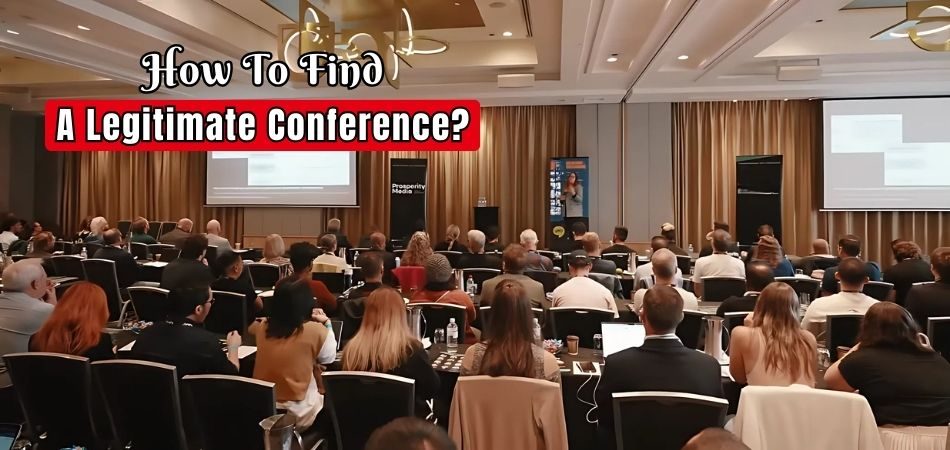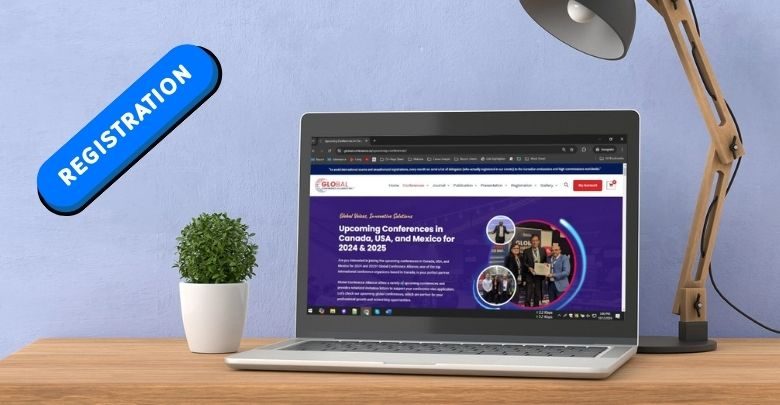Attending a conference can open doors to new knowledge, opportunities, and professional connections. But with so many events out there, it’s crucial to know how to find a legitimate conference that will truly benefit you. Choosing the right one can make all the difference in your career growth.
To find a legitimate conference, start by looking for trustworthy organizers, credible speakers, and detailed event information. Researching online reviews and feedback from past attendees is also a great way to ensure the event’s authenticity. Spotting red flags early can save you from wasting time and resources.
Ready to uncover all the steps to identifying the best conferences? Keep reading to explore a detailed guide on how to find a legitimate conference and make the most of your professional journey.
Why It’s Important to Find a Legitimate Conference?
Finding a legitimate conference is essential to maximize the value of your time and investment. Attending credible events not only enhances your knowledge but also provides unique opportunities for professional growth. Let’s find out why it is important to choose a legitimate conference.
- High-Quality Content: Legitimate conferences focus on delivering valuable, up-to-date content that can help you gain insights into the latest industry trends and practices.
- Networking Opportunities: Genuine conferences attract like-minded professionals and experts, creating opportunities to build meaningful connections that can lead to collaborations, partnerships, or career advancements.
- Access to Industry Leaders: The best conferences often feature reputable speakers who are thought leaders in their fields. Learning directly from these experts can inspire new ideas and strategies for your work.
- Credible Learning Environment: Legitimate events provide a structured and supportive learning environment, developing your skills and knowledge in a way that self-study or online resources cannot.
- Career Growth: Attending reputable conferences can add significant value to your resume or LinkedIn profile. It shows your commitment to staying current and engaged in your industry, making you more attractive to potential employers or clients.
- Avoiding Scams: Perhaps the most practical benefit is avoiding financial loss and disappointment. Knowing how to find a legitimate conference protects you from fraudulent events that waste both your time and resources.
These benefits highlight why it’s crucial to invest effort into finding only the most credible and worthwhile conferences.
How to Find a Legitimate Conference: A Step-by-Step Guide
Finding the right conference can be a game-changer in your career or field of study. But with the rise of online events, spotting a legitimate conference has become more challenging than ever. Let’s break it down into simple steps to help you confidently find a conference worth your time and investment.
Step 1: Start with Thorough Research
Start by looking for conferences on well-regarded event platforms or through industry-specific resources. Focus on events that have a proven track record and have been organized multiple times in the past. Reading attendee reviews and assessing consistency in feedback can help you differentiate between well-established events and those that might not be reliable.
Step 2: Investigate the Organizers
One of the key indicators of a legitimate conference is its organizers. Look up the event organizers and their past events. If they are associated with reputable institutions, companies, or organizations, it’s a good sign. Verify their credentials through their official websites or LinkedIn profiles to ensure they have a track record of credible events.
Step 3: Analyze the Conference Website
A well-organized conference will have a professional website with comprehensive information. Look for details about the agenda, list of speakers, event schedule, and clear registration instructions. A poorly designed site or lack of essential information can be a sign of a less-than-legitimate event.
Step 4: Check the Speaker Lineup
Speakers are the backbone of any good conference. Check the list of speakers to see if they are recognized experts in the field. Google their names to verify their achievements and affiliations. Established professionals are more likely to be involved with authentic events.
Step 5: Look for Social Proof and Testimonials
Search for social proof by checking for testimonials or reviews from previous attendees. Look at what people are saying about their experiences on the conference’s social media pages or review sites. Consistent, positive feedback from past events can be a reliable indicator of a legitimate conference.
Step 6: Confirm the Venue
Legitimate conferences often take place at well-known venues or universities. For example, when looking into upcoming conferences in Canada, contacting the venue directly can confirm that the event is indeed scheduled there. This small step can help you avoid scams, especially when the event’s location details seem unclear or questionable.
Step 7: Review the Registration Process
The registration process should be straightforward, with a clear breakdown of fees and secure payment methods. Be cautious of events that request payment via unofficial channels or offer suspiciously low registration fees. Always make sure the payment page is secure before entering your details.
Step 8: Examine the Conference Partners and Sponsors
Trusted conferences often have reputable partners or sponsors backing them up. Check if the event has any well-known sponsors or if it’s associated with credible organizations. This partnership is usually a positive sign that the conference is legitimate and supported by established entities.
By following these steps, you’ll gain confidence in how to find a legitimate conference that meets your needs and adds real value to your professional journey.
How to Research the Conference’s Background and Reputation?
Researching a conference’s background and reputation is crucial to ensuring you’re investing your time and resources wisely. The more informed you are, the better your chances of finding a conference that offers genuine value. Here are the ways to dig into a conference’s credibility.
Check the Event History
Look for information on how long the conference has been running. Established events with multiple editions often have a solid track record. An annual or regular occurrence usually indicates the event’s success and reliability.
Investigate the Organizers
The credibility of the conference often rests on its organizers. Research their past events and affiliations. Well-known institutions or experienced professionals as organizers can be a sign of a legitimate conference.
Read Attendee Reviews
Look for reviews and testimonials from past attendees. Platforms like LinkedIn or event review sites can provide honest feedback. Positive experiences shared by others give you insight into the conference’s value and impact.
Verify Speaker Credentials
Legitimate conferences attract recognized industry experts. Search for the listed speakers online to confirm their expertise and association with the event. High-profile speakers often lend credibility to the conference.
Check Social Media Presence
An active social media presence can signal a legitimate conference. Look for engagement on platforms like Twitter, Facebook, or LinkedIn. Genuine events will have regular updates, follower interactions, and industry-related content.
Explore Online Forums and Communities
Online communities like Reddit or Quora can be great places to ask for opinions about the conference. If you’re specifically looking to find paper submission conferences, these forums often share lists and reviews of reputable events. Honest, unbiased feedback from those who have attended can help you decide whether the event is worth your time.
Taking these steps will give you a comprehensive understanding of the conference’s background and reputation, ensuring you make an informed decision before committing to it.
Tips for Checking Speaker Credentials and Attendee Feedback
Ensuring the credibility of a conference often starts with examining its speakers and listening to the experiences of previous attendees. Speakers with solid reputations and positive attendee feedback can be strong indicators of a worthwhile event. Here are some essential tips to help you check speaker credentials and attendee reviews effectively.
Research Speaker Backgrounds on LinkedIn
Start by looking up the speakers on LinkedIn. This professional platform is a great place to verify their work experience, achievements, and industry standing. Check their profiles for any inconsistencies or exaggerated claims, which might suggest they’re not as credible as they seem.
Look for Past Speaking Engagements
A legitimate conference speaker often has a history of speaking at similar events. Search online for videos or mentions of their previous engagements. If the speaker regularly participates in reputable industry conferences, it’s a good sign that they bring genuine expertise to the table.
Check for Professional Affiliations
Verify if the speakers are affiliated with well-known organizations, universities, or industry groups. Such associations often validate their credibility. Speakers linked with respected institutions usually have the knowledge and experience to contribute valuable insights to the event.
Read Attendee Reviews on Social Media
Social media platforms like Twitter, Facebook, and LinkedIn can offer honest feedback from past attendees. Look for posts or comments that mention the conference or specific speakers. Positive feedback and discussions about valuable insights are clear indicators of a credible event.
Join Industry-Specific Forums
Participating in industry-specific forums or discussion groups can provide insights from those who have attended the conference before. Websites like Reddit and Quora have communities where professionals share their experiences, giving you an unfiltered view of what to expect.
Thoroughly checking speaker credentials and attendee feedback can help you identify conferences that are worth your time and investment.
What to Do If You Suspect a Conference Is a Scam?
Suspecting a conference might be a scam can be frustrating, especially when you’ve already invested time or money into the event. But don’t worry; there are steps you can take to protect yourself and potentially recover your losses. Here are the actions you should consider if you think a conference is not legitimate.
Research the Conference Again
Take a closer look at the conference details and the organizer’s background. Search for recent reviews or complaints. If you notice a lack of information or negative feedback, it could confirm your suspicions.
Contact the Organizers Directly
Reach out to the event organizers through the official contact details provided on their website. Ask specific questions about the event and gauge their response. A vague or defensive reply is often a red flag.
Warn Others on Social Media
Share your experience on social media platforms and industry forums. By informing others, you might find people who have faced similar situations. Your post could also help prevent others from falling into the same trap.
Report the Scam to Authorities
Report your concerns to consumer protection agencies or organizations that deal with online fraud. In many cases, they can offer advice or take action against the scammers to protect other potential victims.
Contact Your Payment Provider
If you’ve already made a payment, immediately contact your bank or credit card company. Request a chargeback or refund, explaining that you suspect the transaction was part of a scam. Early action increases the chances of getting your money back.
Leave Reviews and Feedback
When choosing conferences to attend in the future, write honest reviews on event platforms, social media, and forums. Detailing your experience can alert others and potentially discredit the scammer’s future attempts to lure in attendees.
Taking these proactive steps can help you recover from a scam and prevent others from experiencing the same. Don’t hesitate to act quickly—your prompt action is crucial in stopping fraudulent conferences in their tracks.
How to Avoid Common Scams When Registering for Conferences?
Registering for conferences should be a straightforward process, but it’s easy to fall victim to scams if you’re not careful. Protecting yourself begins with knowing what to look for. Here are the effective ways to avoid common scams when registering for conferences.
Register Only on Official Websites
Always register through the conference’s official website. Avoid third-party links or unfamiliar pages that could lead to phishing scams. Double-check the URL to ensure it matches the official site.
Verify the Conference’s Legitimacy
Before entering any details, research the conference thoroughly. Look for reviews, testimonials, and information about past events. Legitimate conferences often have a strong online presence and a history of successful gatherings.
Be Wary of Suspiciously Low Fees
If a conference’s registration fee seems too good to be true, it probably is. Compare the cost with similar events in the same industry. Scammers often lure people in with unusually low prices.
Look for Secure Payment Methods
Always use secure payment methods like credit cards or trusted payment gateways. Avoid direct bank transfers or unfamiliar payment platforms. Secure transactions help protect your financial information from fraud.
Check Contact Information
A legitimate conference will have clear and accessible contact information. If you can’t find a phone number, email, or physical address, consider it a red flag. Reach out with any questions to test their responsiveness.
Watch Out for High-Pressure Tactics
Scammers often use urgency to rush you into registering. Be cautious if you’re pressured to act quickly without enough time to verify details. Take a step back and do your research before committing.
Following these tips can help you steer clear of scams and ensure you’re investing in valuable and credible conference experiences. Stay vigilant, and always prioritize your safety when registering.
Frequently Asked Questions
When trying to find a legitimate conference, it’s natural to have some questions in mind. Here are some frequently asked questions that many people have when handling the process of identifying trustworthy events.
Can I Trust Conferences Advertised on Social Media?
Yes, but proceed with caution. While many legitimate conferences use social media for promotion, it’s essential to verify the event’s details by checking its official website, organizer credentials, and online reviews to ensure it’s credible.
Is it Safe to Share Personal Details when Registering for a Conference?
Yes, as long as you’re using the conference’s official website. Legitimate conferences have secure registration forms that protect your data. Always check for HTTPS in the URL to ensure your personal information remains safe from potential threats.
Are Free Conferences Always Scams?
No, not always. Some free conferences are genuine, and organized by reputable institutions or non-profits. However, it’s wise to verify the event details and confirm the credentials of the organizers to ensure you’re not falling for a scam.
What Should I Do if a Conference Demands Immediate Payment?
If a conference pressures you into making an immediate payment, consider it a red flag. Take a step back, research the event thoroughly, and look for reviews or testimonials from previous attendees before proceeding with any financial transactions.
Do Legitimate Conferences Provide a Refund Policy?
Most credible conferences offer a clear refund policy if you’re unable to attend. Check the event’s terms and conditions on its official website to understand the refund procedure, which indicates its commitment to professionalism and transparency.
Last Words
Attending the right conference can be revolutionary in your career, but only if you know how to find a legitimate conference. Investing your time and resources wisely is essential to gain the most value from these events.
By carefully researching the event’s organizers, speakers, and feedback from past attendees, you’ll be well-equipped to spot a credible conference from a mile away. Each step you take toward verifying the details boosts your chances of attending a worthwhile event.
Now that you know how to find a legitimate conference, you can confidently navigate your options and make informed decisions. Keep these strategies in mind, and you’ll be ready to choose the best conferences for your professional growth.








